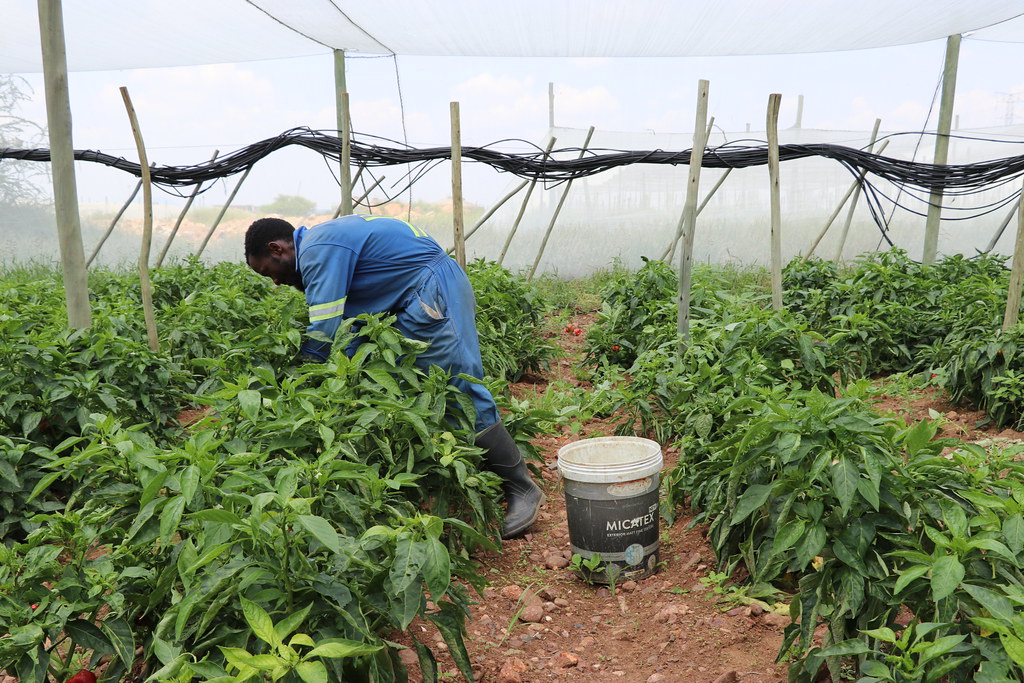There Are Women in Botswana
It’s not even news that women and children leads AIDS activism in places like Botswana, except when it’s scanted. So, here’s a primer.

A pepper greenhouse in Gaborone, Botswana. Image: Global Water Partnership via Flickr CC.
National Public Radio featured a piece this morning entitled “Botswana’s ‘Stunning Achievement’ Against AIDS.” The article reported Botswana’s very high rate of HIV and, equally, its remarkably thorough and effective response to the HIV/AIDS pandemic. Here’s an example of the success of the government’s response: “Transmission of HIV from infected mothers to their fetuses and newborn babies has been brought down to just 4 percent.”
Kudos to Botswana on this. To NPR, not so much. That sentence is the last time the women of Botswana get any mention. From there, it’s all men. This in a country in which the Director of HIV and AIDS Prevention, Dr Refeletswe Lebelonyane, is a woman. How ironic.
The centrality of women and girls to any hope of addressing anything about HIV and AIDS in Botswana, as elsewhere, is no secret. It’s not even news, at some level, except, as in this case, when it’s scanted. So, here’s a primer.
According to the Government of the Republic of Botswana, “[in] the adult female age groups, the least affected are the females aged above 50 years with prevalence rate of 12.9%. The females in the reproductive ages have been severely affected by HIV with prevalence of 29.4%. Women in the age group 25 – 29 (41.0%) are next to age group 30 – 34 (43.7%) followed by those in the age group 35 – 39 (37.8%).” This is not a case in which the government has shied away from the places and placements of women and girls in the landscape of HIV and AIDS.
And it’s not like this is new information. Four years ago, Grace Sedio, then the Project Officer of Bomme Isago Association/International Community of Women Living with HIV/AIDS in Botswana, wrote, “When You Think of Botswana and HIV/AIDS, Think of the Women.” Her piece, interestingly, was also a corrective to an NPR piece. Sedio’s policy advice was succinct and common sense: Support women’s sexual and reproductive health services. Support women’s human rights. Support prevention. All of that begins and ends with thinking of the women.
Sedio’s advice came out of her own experiences, out of decades of research scholarship in the field, and out of the histories of various social movements and non-governmental movements. It’s not secret or arcane knowledge. In Botswana, this is common knowledge.
Women know this and have led the struggle. In 1986, women organized Emang Basadi to advocate for and to assist women. In 1995, Dr. Sheila Dinotshe Tlou founded the Society for Women and AIDS in Africa, Botswana, or SWAABO. She was also Minister of Health from 2004 to 2008, key years in the ‘stunning achievement’ of Botswana. In 1999, K. Letsididi founded Lentswe La Basadi ba Botswana, Voices of Botswana Women, or LLBB. LLBB is a women’s writing group that links domestic abuse and sexual violence to the spread of HIV and AIDS. In Botswana, women advocates, women researchers, women writers, women organizers, women have led anything that might be called “stunning.”
Women in Botswana continue the struggle. HIV+ women continue to battle depression, they continue to struggle for decent and dignified reproductive and sexual health services and policies, they continue to struggle with sexual violence and with the gender inequalities of which it is a part, they continue to struggle with the complex of ethical and human rights that emerge in pre-natal HIV/AIDS testing. They continue to struggle with the centrality of women. Ethical and human rights are women’s rights, women’s rights are ethical and human rights. NPR does the “stunning” women of Botswana a disservice when it excludes and marginalizes them.
In “A Litany for Survival”, Audre Lorde wrote of the fear that kills all, from without and from within, and concluded: “So it is better to speak / remembering / we were never meant to survive.” The women of Botswana have been speaking … loud and proud, and they have been surviving, stunningly.
Tell NPR.

